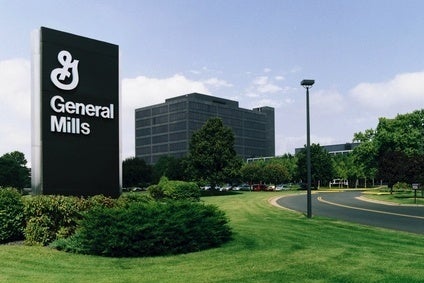General Mills chief Ken Powell did his best yesterday (25 June) to be positive despite a surprise fall in sales in the US food giant’s fourth quarter rounding off a challenging year for the company.
The Old El Paso and Yoplait owner saw net sales drop 3% in the three months to 25 May. General Mills’ annual sales were up 1% but the fourth-quarter performance brought an end to a financial year when the company’s top-line performance steadily got worse.
It is in the US where General Mills is perhaps facing its biggest challenge. Sales in Europe fell but elsewhere General Mills’ international business is performing rather well, thanks in part to solid growth in China and very rapid growth in Latin America.
However, General Mills’ US Retail business accounts for almost 60% of net sales and over three-quarters of its EBIT. Sales from that division last year were flat, while EBIT was down 3%, with both numbers hitting the company’s overall results.
Alongside the full-year figures, General Mills announced it was taking action to boost profitability. The company revealed its manufacturing and distribution network in North America are under review, with management eyeing ways to streamline its operations and possible reduce capacity.
With sales growth in the US grocery market hard to come by, a number of US food manufacturers are looking again at their cost base bolster profits.

US Tariffs are shifting - will you react or anticipate?
Don’t let policy changes catch you off guard. Stay proactive with real-time data and expert analysis.
By GlobalDataGeneral Mills has an ongoing programme to monitor costs (dubbed Holistic Margin Management) and that will, it said, help deliver savings again in the new financial year. However, the moves outside that scheme to cut costs indicates General Mills knows, with swathes of the US grocery market in the doldrums (especially its categories), it has to act.
The company is, Powell insisted, looking at ways to boost its top line. The General Mills boss said all the right things. Cereals is General Mills’ largest business by sales in the US. Consumers there are increasingly looking at protein options for breakfast and the company would look at more protein-heavy lines to target those consumers, Powell said. Gluten free is also becoming more of a favourite at breakfast; again, General Mills will act and launch more products in that category, Powell explained.
Yoghurt arm Yoplait had another year of falling sales in the US but Powell insisted that part of General Mills’ business had finished the financial year with “clear momentum”. In a nod to growing consumer interest in ingredients, General Mills is removing the sweetener aspartame in Yoplait Light in the US. Greek yoghurt, the engine of the yoghurt sector in the US but one where General Mills was slow to react compared to some rivals, had, Powell said, seen growth “stabilise”. He added: “Overall, as we look at that yoghurt category, we just think that the dynamics are going to be a bit more in our favor, in our full portfolio.”
Perhaps most interestingly, Powell said, General Mills would be “accelerating our strong performance in better-for-you snacks”, demonstrating the company is aware of a growing – and rapidly-growing – trend in the US and wants to capitalise on it, rather than only trying to nurse cereal and yoghurt back to growth.
General Mills expects net sales to increase at a “mid-single digit” rate in 2014/15 helped by the fact the new year includes a 53rd week. It forecast net sales from its US Retail business will grow by the same rate.
However, Powell perhaps belied his recognition at the challenging trading conditions in the US when one analyst asked how the US packaged food industry could “fix” the “main problem” facing it.
“I wish there was one silver bullet,” Powell said – before saying “it depends on the category” and pointing to possible ways to reboot growth, through targeting areas like health and wellness and snacking. “We are in changing times. We are marketing company so our job is to understand the change and capitalise on it, find opportunity there.”
However, while General Mills appears to have identified possible ways to revitalise its key US business, the proof of the pudding will be in the consumer acceptance and execution. Competition from merchandising space hit margins in the fourth quarter and it is sure to only remain challenging to secure the right space on shelf. Competition will remain fierce in such buoyant and fast-growing areas like protein and gluten free.
Could M&A therefore be an option for Powell and his management team? General Mills’ last acquisition was in May 2012 when it bought Brazilian food manufacturer Yoki. Perhaps General Mills could look to buy expansion in areas like gluten free or snacking? Could a US company like Kind LLC be a target, with its success in securing 5% of the country’s snack-bar category?
Asked how much consideration General Mills was giving to M&A, Powell said yesterday: “We were clear that F14 was the year of consolidating some large acquisitions we done, and then returning cash to shareholders. We have continued to work during F14 to look at new opportunities in the same markets, the same areas that we have talked about previously getting deeper in emerging markets and better for you snacking in the US or in developed markets more broadly.”
With sales growth under pressure in some key businesses, there is plenty for General Mills to ponder.





